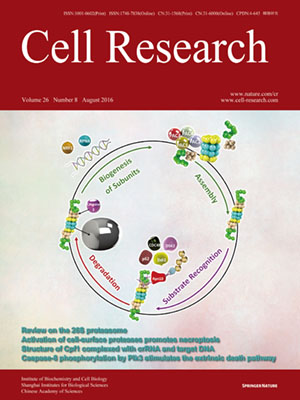
Volume 26, No 8, Aug 2016
ISSN: 1001-0602
EISSN: 1748-7838 2018
impact factor 17.848*
(Clarivate Analytics, 2019)
Volume 26 Issue 8, August 2016: 963-966 | Open Access
LETTERS TO THE EDITOR
Distribution of IgG galactosylation as a promising biomarker for cancer screening in multiple cancer types
Shifang Ren1,*, Zejian Zhang1,*, Congjian Xu2, Lin Guo3, Renquan Lu3, Yihong Sun4, Jianming Guo5, Ruihuan Qin1, Wenjun Qin1 and Jianxin Gu1
1Department of Biochemistry and Molecular Biology, Key Laboratory of Glycoconjugate Research Ministry of Public Health, School of Basic Medical Sciences, Fudan University, Shanghai 200032, China
2Obstetrics and Gynecology Hospital, Fudan University, Shanghai 200032, China
3Department of Clinical Laboratory, Shanghai Cancer Center, Fudan University, Shanghai 200032, China
4Department of General Surgery, Zhongshan Hospital, Fudan University, Shanghai 200032, China
5Department of Urology, Zhongshan Hospital, Fudan University, Shanghai 200032, China
Correspondence: Jianxin Gu, Tel: +86-021-5423-7704; Fax: +86-021-6443-7203(jxgu@shmu.edu.cn)
Cancer is prevalent worldwide. Currently, most routinely used non-invasive serological cancer biomarkers, including carcino-embryonic antigen (CEA), prostate-specific antigen (PSA), α-fetoprotein (AFP), CA125, CA15-3, and CA19-9, suffer from low specificity and/or low sensitivity1. Improvements in timely and effective diagnosis of cancer are urgently needed. Most serum proteins are glycosylated, and deregulation of glycosylation has been reported to be associated with a wide range of diseases including cancer2.
10.1038/cr.2016.83
FULL TEXT | PDF
Browse 2021


